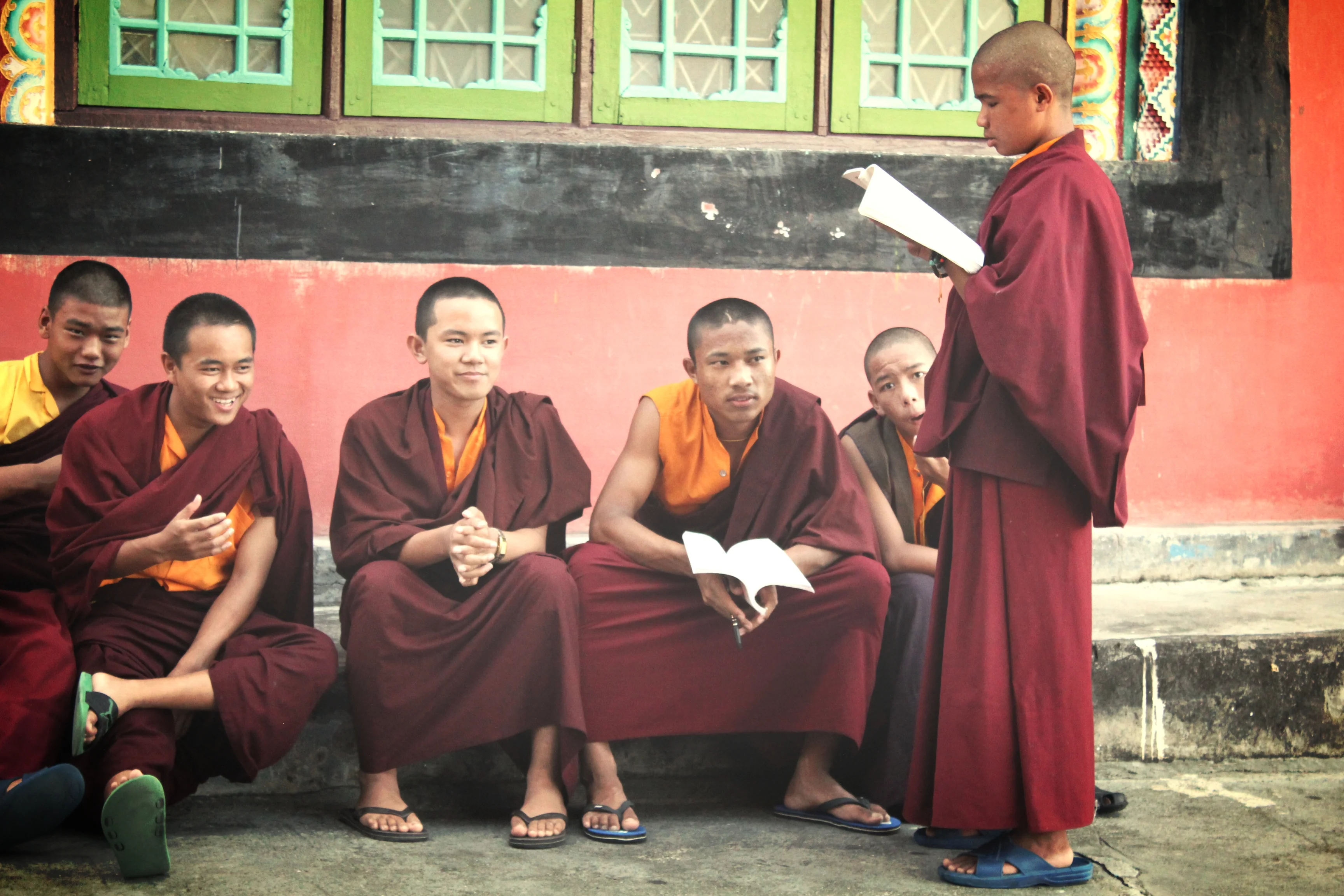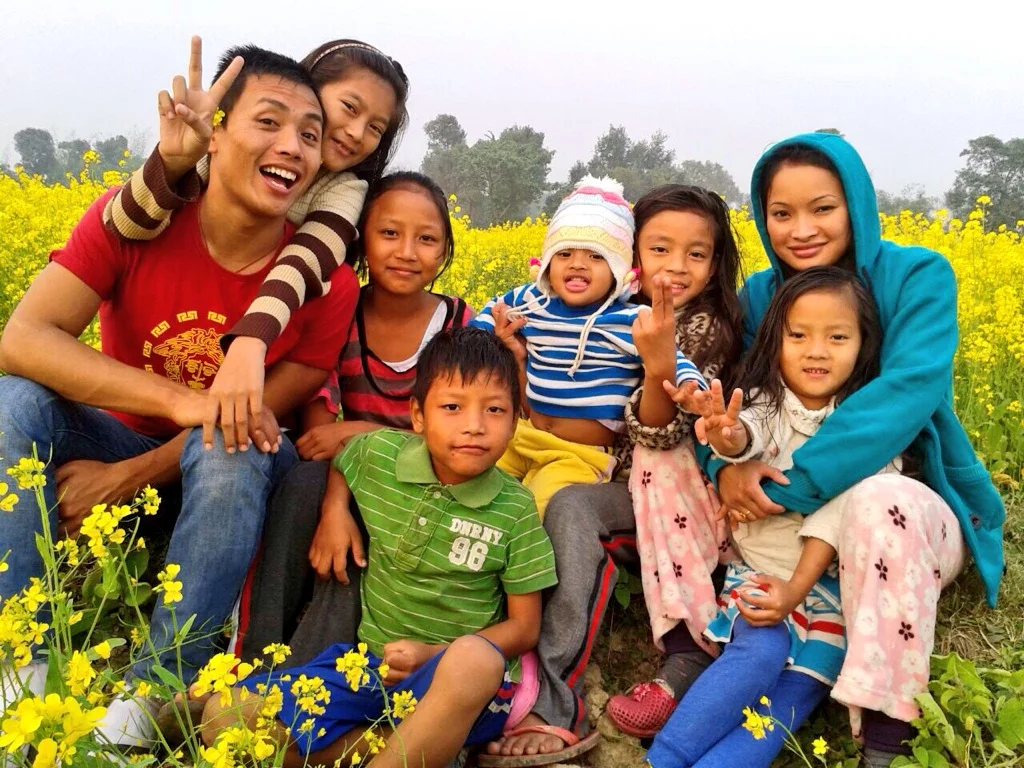I'm posting my ideas here to encourage others to think big.
Solar installation for Pokhara community
Gham Power has been working hard to install solar at Matepani. It's hit over eighty degrees for many days and the sun is blistering, but they're determined.
When I step on the roof, I see this:
I'm still in awe. So many people supported this project and so many have worked very, very hard. The community continues to voice their enthusiasm and excitement. Sangpo has been an incredible team lead. And now, here it is --- what was once imagination is now real.
These five solar panels are tangible representation that differences can be made, people do care, and when many people come together, magic can happen.
When I think about the light that will now be provided to sons who have been sent from places across Nepal and India, I think that yes, together, we can create positive change. Yes, people do care. Yes, we are all in this together.
I can't say thank you enough.
Perfect moments and travel
The right to information and quality education
One of my favorite rituals in Nepal is walking to the center market to buy a newspaper. There's one corner where all of the newspapers are laid on the ground and sold. While the election was happening, I'd stand there with a handful of men and wait for the papers to arrive in a small taxi, lifted in stacks of tied twine and quickly dispersed. I would patiently wait for one of the English papers to emerge from the car's trunk and hurry back to the school, paper tucked beneath my arm.
It didn't take long to discover what a treasure the paper was to my students. "Newspaper delivery" isn't exactly an option for the Gumba, so this foreign object was eagerly passed between hands. Sometimes several boys would gather around the sports section to see the latest football results.
Watching them fueled my desire to improve access to education. Access to news shouldn't be a privilege. I believe everyone has the right to information and quality education. Unfortunately, in Nepal, the best schools come with a price, and many families are limited by their economic status.
Your anonymous donation is a testament to your commitment to education and opportunity for all. I think we can work together to make some changes happen. We're starting with Matepani.
NYC or Nepal, we're in this together
We all have hopes. We all have dreams.
Whether living inside a monastery in Western Nepal or in Brooklyn's Greenpoint, the wishes are the same. The feelings are there. Emotions run like a current.
People are people, no matter where you are. When we begin to realize we're all in this together, the magic begins. At the end of the day, our humanity unites us. Kindness and love know no cultural boundary.
Thanks for emphasizing the good parts, Chandler.
Learning and the importance of role models
"Every child deserves a champion — an adult who will never give up on them, who understands the power of connection, and insists that they become the best that they can possibly be." Rita F. Pierson
Thank you, David, for supporting Matepani's continued academic progress and development.
Mindfulness and gift-giving
I have a confession to make: the yo-yos are my fault. Well, my mom's fault really, as she mailed a box of books and art supplies...and yo-yos. Games aren't typically welcomed at the monastery. During one of the Nepali holidays, a neighborhood family brought kites to the Gumba, and the monks enviously watched these children run around with their colorful toys.
I had to explain to my mother the importance of cultural competence when looking for ways to help. It's essential to be mindful and respectful of the traditions of a place. Needless to say, it was the monks' first encounter with yo-yos. They quickly got the hang of it.
Pierre, thank you for helping us mindfully support the Matepani community.
The laughter of monks
I've heard laughter is a sign of a happy heart. I've never laughed so loud or so hard before meeting these guys. If their smiles and joviality is any indicator of their happiness, I'd say they are doing something right.
Thank you for supporting their continued wellbeing, Barbara.
Leadership in classrooms
There are presently four different grade levels at Matepani. Students are placed in classes according to skill level and the age at which they enter the monastery.
Each class has assigned captains. The role encourages leadership and responsibility among the students. Captains make sure students do their work and arrive on time to class.
With many monks coming from different socioeconomic classes and backgrounds, having a "point person" for each level helps create a family atmosphere at the monastery.
Thanks for supporting our family, Eric.
To find great adventures listen to you heart
When the opportunity to fundraise to travel to Nepal first presented itself, I jumped. I didn't know much about the country, but I had heard about the trek to Everest Base Camp. It was this journey that lured me to the Himalayas, but the greatest adventure began with my heart.
Over the course of several months, I fell in love with Nepal --- the people, the countryside, the rich culture. Experiencing the kindness of strangers, watching devotion to family, and sharing boisterous fits of laughter under clear night skies drew me closer and closer into the heart of this land.
I'm honored to give back to a place that has given me so much. Thank you for sharing this adventure with me, Stuart.
When simple gifts become a big deal
Radiant culture in Nepal
Seven year olds learn circular breathing techniques
Friendship
Partnerships in Colorado to support teachers in Nepal
Teaching English in Nepal - tips and resources
Resilience and families in Nepal
Thank you for supporting our solar project, Tariq. I'd like you to meet one of the families who have inspired me to promote education and leadership within Nepal.
Matepani Solar Project FAQs
Matepani Gumba, Kaski, Nepal
Where is it and who lives there?
Matepani Gumba rests on a hilltop jungle in Western Nepal. Established in 1960 on the outskirts of Pokhara, the place serves as monastery, school, community center and boarding home for approximately eighty men ages 5 to 86.
Many of the students come from disadvantaged Gurung and Manangi families. They are brought to the monastery as small boys, and 80-90% will leave as young adults. By supporting their education and development, those who decide to leave the monastery will have an easier time finding work and creating a life for themselves.
Why don't they have power?
Blackouts are a regular occurrence in Nepal. From October until July, the coldest and darkest months of the year, the Nepali government restricts electricity for as many as 16 hours per day.
How will this solar project help?
A hybrid model will use the existing grid and solar cells to light classrooms and provide reliable power for up to two days of blackout. Money will be saved on energy bills, along with savings on candles and flashlights.
Who is Gham Power and what will $8k provide?
Gham Power is a team of Nepali engineers and executives. They have installed solar grids at hospitals, children’s homes, and a research lab at Mt. Everest’s Base Camp. Their estimated project budget will provide equipment, installation, and two years of support. They will also instruct the members of the Matepani community on maintenance and monitoring of the system.
To review the complete proposal and project budget please click here.
How you can help
- Share this post with friends.
- Visit bit.ly/lightnepal to make a donation (and choose a reward).
- Comment on our campaign. Every like, message, share, and contribution ups our "gogo factor" and increases the likelihood of our page being featured.
- Your positive thoughts! Many people are working hard to make this happen. Good energy is appreciated by all as we make this dream a reality. Dhannyabad!
5 things you may not know about Buddhist monks
Americans have developed a picturesque image of a solitary monk resting upon a snowy mountaintop, silently meditating towards enlightenment, and pondering the meaning of life without a care in the world.
In reality, monk life is far from easy.
1. Many monks are brought to monasteries as children.
This means they haven't made their own decisions to pursue monastic order. Monks as young as two years old have been associated with Buddhist reincarnations. Families with limited economic means often consider monasteries the best option for their child; other families view monasticism as a great honor, willingly giving up their sons for recognition within the community and on a karmic level. Sometimes, boys are taken to monasteries in response to misbehavior and misdeeds.
2. Meditation isn't a leisure activity.
Monks follow a strict routine. Mealtimes, ceremonies, and study are highly scheduled, and free time is limited. Once a week, monks are granted time to relax and can be found playing soccer or watching television.
3. Education is not universal.
What is taught (and how) varies from monastery to monastery. Tibetan Buddhism is particularly laden with rituals and superstitious practice. From boyhood, monks learn chants and a variety of spiritual ceremonies. While some monasteries offer Social Studies, Math, and language in addition to Buddhist Dharma and practice, the inclusion of secular subjects has been a topic of debate.
4. Many forms of Buddhism exist.
While most Americans are familiar with the Dalai Lama, there are several sects and branches of Buddhist philosophy. You can think of monasteries as you might American universities: some receive government and outside financial support while others rely on the community in order to provide opportunity and education for students. At present, there is not an overarching or governing body that regulates the monastic community at large.
5. Monks leave monasteries.
Imagine being brought to a monastery as a small child. There may come a time when you decide to pursue other opportunities -- perhaps you'd like to attend university, open a business or start a family. As a young boy, your parents left you in the care of a community of men who became your family. It is a difficult decision to leave, and many monks are ostracized from their biological families as a result. Through education and skill acquisition, monks can make their own decisions regarding their future.
Dinners for education
When a group of strangers gathered for an underground dinner in New York City, they had no idea who they might meet... or that proceeds from the event would sponsor English education in Nepal. Attendees from Project Exponential have provided Manoj's March salary. A warm thank you to all those who participated.













